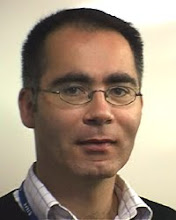As I mentioned in previous post John Kay has taken on economics as not being a science. However, in his latest piece in Prospect he laments that we have wasted a good crisis. The window of opportunity to change the narrative, to remove some of the sacred cows of the policy debate seems to have closed, as I briefly mentioned. He does a good job of highlighting how the story changed from greedy bankers being reckless to blaming the government for not regulating them enough. This was the government that in every other way was supposed to be too big, too burdensome and too much in the way, right?
So that economics is a discipline in need of renovation if not revolution is getting lost in the return to the new normal. There is some hope though, some within and some without the field of economics who are prepared to point to the emperor's new clothes. For example, Joe Stiglitz has been very direct in saying that there needs to be a crisis in the discipline, that macroeconomics essentially failed when challenged by the credit crisis. These comments were part of his recent speech at the Lindau Conference, which brings together Nobel laureates with promising young researchers and has been running since 1951. Interestingly this meeting is only the fourth dedicated to economics, with a plan to have such a focus every three years, and as he says at the meeting in 2008 nobody was talking about the crisis. Other economists willing to challenge the status quo include Ha-Joon Chang and his influential 23 Things They Don't Tell You About Capitalism.
The problem is that too many policy positions are bunged up with people who may have the best intentions but don't have the time and space to reinvent the discipline on the fly. They are faced with real problems in real time. It may take a generation to get new thinking deep into multilateral and national government organisations. Hence the hope that new courses such as that at the Blavatnik School of Government at Oxford will produce policy folks with a broader set of perspectives.
In the meantime there is a real need for the discipline to potentially go back to the start, right back to the beginning and build itself anew. The challenge is immense, both intellectually and in terms of trying to get enough minds pointed in a common direction. This may be the moment when we need to opensource economics and start producing an economics fit for the real world.
As I mentioned there are some folks heading in this direction. A great example is Doyne Farmer at the Santa Fe Institute. He's trying to build an agent based model of the US housing market that works at the level of the individual (here's a video of him talking about it to INET who have funded some of his work). Horrendously complicated but a great attempt to start afresh. And the really interesting thing about Prof Farmer? He was a physicist before he got into all of this!
Here's to starting with a blank sheet of paper and seeing if we can build an economics that actually works.
Best
Finbarr
Subscribe to:
Post Comments (Atom)

No comments:
Post a Comment